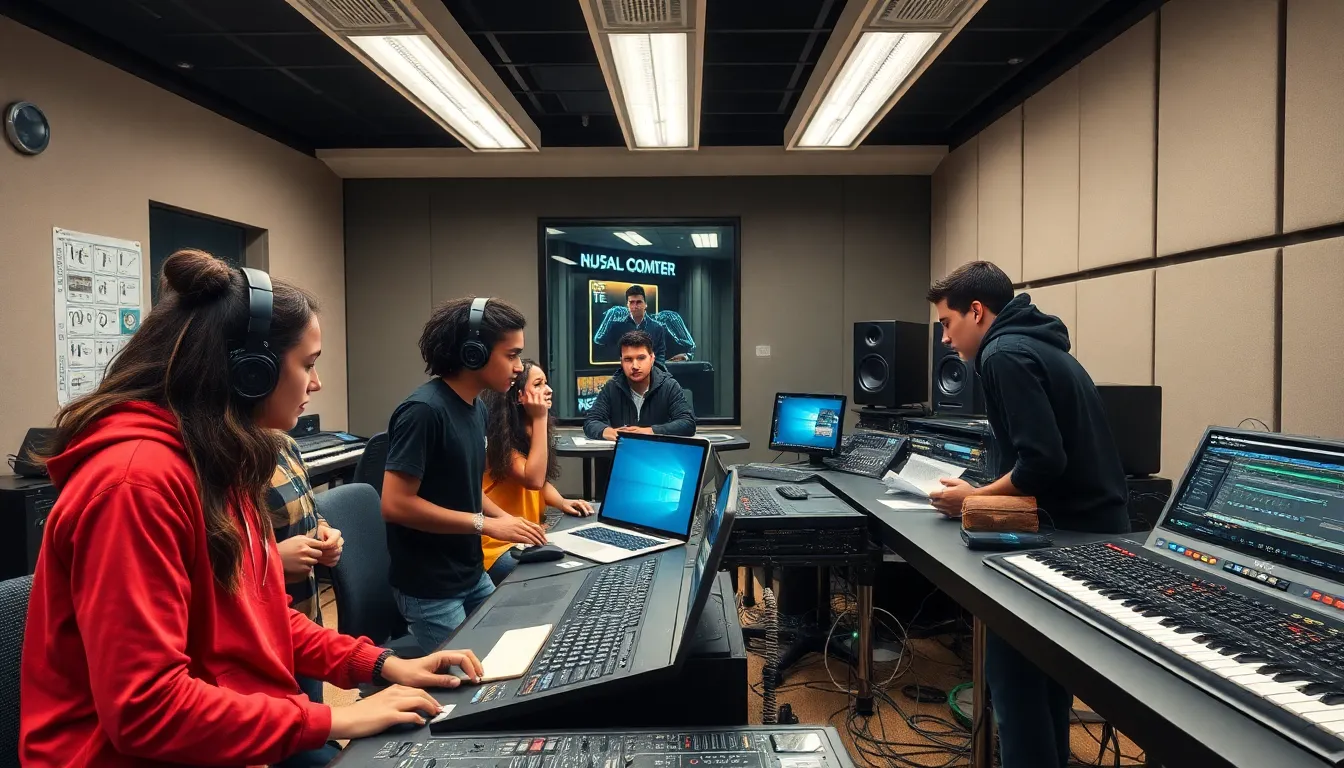In a world where playlists reign supreme and podcasts have become the new radio, an audio technology degree isn’t just a piece of paper; it’s a golden ticket to a sound-filled future. Imagine diving into the realms of sound design, mixing, and mastering, all while perfecting the art of making your friends jealous of your killer audio skills.
Table of Contents
ToggleOverview of Audio Technology Degree
Audio technology degrees focus on the skills necessary for success in the evolving media landscape. Programs often cover sound design, mixing, and mastering, which are essential in creating engaging audio experiences. Students gain hands-on experience using industry-standard equipment and software.
Coursework typically includes topics such as audio engineering, acoustics, music production, and digital audio workstations. These subjects provide a solid foundation for understanding the technical aspects of audio production. Knowledge of these areas enhances career prospects in various fields.
Internships and practical projects often form a crucial part of the curriculum. Students work with professional audio technicians and producers, providing valuable networking opportunities in the industry. Graduates leave programs equipped with real-world experience and a portfolio showcasing their abilities.
The demand for skilled audio professionals continues to rise, driven by technological innovations in media. Graduates may pursue careers in diverse areas, including recording studios, post-production houses, and live sound environments. Additionally, expertise in audio technology can lead to opportunities in video games, film, and multimedia production.
With an audio technology degree, individuals stand out in competitive job markets. Creativity and technical proficiency open doors to numerous career paths. Ultimately, obtaining this degree prepares students for the challenges and possibilities within the audio industry.
Core Curriculum Components

Core curriculum components in an audio technology degree provide essential knowledge and skills for aspiring audio professionals. Courses cover a wide array of subjects.
Essential Courses
Essential courses lay the foundation for success in audio technology. Audio engineering builds technical skills crucial for capturing and manipulating sound. Acoustics delves into the science of sound, enhancing understanding of how sound behaves in different environments. Music production teaches the art of creating and arranging music, while digital audio workstations provide hands-on experience with industry-standard software. Each course equips students with the competencies needed for various roles in the audio industry.
Electives and Specializations
Electives and specializations enable students to tailor their education to specific interests. Courses in sound design focus on creating audio elements for film and video games, while live sound courses prepare students for events and concerts. Music business electives cover industry essentials like copyright and licensing, equipping graduates for diverse career paths. Combining electives with core courses offers a comprehensive education, enhancing marketability in a competitive job landscape.
Career Opportunities
Graduates with an audio technology degree can explore various career paths in a thriving industry. Skilled professionals are in high demand across multiple fields related to audio production.
Job Roles in Audio Technology
Audio technology offers a range of job roles. Sound engineer positions involve recording, mixing, and mastering audio for various media. Music producers manage the overall product and could lead diverse projects, ensuring the music aligns with artistic vision. Additionally, live sound technicians work at concerts and events, ensuring optimal audio quality for audiences. Sound designers focus on creating auditory elements for film, television, and gaming, contributing to immersive experiences. Furthermore, audio post-production specialists refine audio tracks and implement sound effects, which enhance storytelling.
Industry Outlook
The industry outlook for audio technology remains positive. Employment for sound engineering and audio technician jobs is projected to grow by 8% from 2020 to 2030, according to the U.S. Bureau of Labor Statistics. Innovations in streaming services and digital media drive this demand. Growth opportunities exist in podcast production and mobile app development, expanding the market for audio professionals. Emerging technologies, such as virtual reality and artificial intelligence, also create new avenues for audio creativity. The ability to adapt and learn new tools and trends will define future success in the industry.
Skills Acquired Through the Degree
An audio technology degree equips individuals with vital skills essential for success in the audio industry. Graduates develop a blend of technical expertise and interpersonal abilities that enhance their marketability.
Technical Skills
Technical skills gained through an audio technology degree include audio engineering, sound design, and music production. Mastery of digital audio workstations enables graduates to manipulate sound effectively. Knowledge of acoustics plays a crucial role in creating optimal audio environments. Experience with industry-standard equipment and software prepares students for hands-on work in various settings. Understanding audio signal flow, microphone placement, and mixing techniques enhances practical capabilities. Students also learn to troubleshoot technical issues, ensuring smooth operation during live events or studio sessions.
Soft Skills
Soft skills complement technical knowledge and play a vital role in the audio industry. Communication skills foster collaboration with clients and coworkers. Problem-solving abilities help tackle challenges that arise in creative processes. Adaptability allows professionals to keep up with rapidly changing technologies and trends. Critical thinking enhances decision-making in artistic and technical realms. Networking skills contribute to building valuable connections within the industry. Time management ensures project deadlines are met without compromising quality.
An audio technology degree opens doors to a vibrant and evolving industry. With a solid foundation in technical skills and hands-on experience, graduates are well-equipped to navigate various career paths. The growing demand for audio professionals ensures ample opportunities in recording studios, live sound environments, and multimedia production.
As technology continues to advance, the landscape of audio production will expand, offering new challenges and creative avenues. Those who stay adaptable and embrace emerging trends will find themselves at the forefront of innovation. Pursuing an audio technology degree not only enhances one’s expertise but also positions them for a successful and fulfilling career in the audio world.







